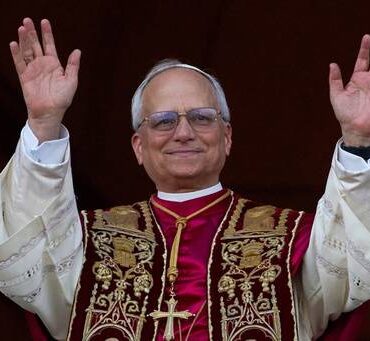God sends us shepherds after His own heart

May 11—Fourth Sunday of Easter, Good Shepherd Sunday
Readings: Acts 13:14, 43-52; Psalm 100, R. We are his people, the sheep of his flock.; Revelation 7:9, 14b-17; Gospel—John 10:27-30
I will give them shepherds after my own heart.” (Jeremiah 3:15) This ancient promise of God rings anew as we celebrated a few days ago the election of Pope Leo XIV, the 267th Roman Pontiff.
The election of a new pope a few days before we celebrate Good Shepherd Sunday today augurs well for us, his flock.
This is the first point I offer for our prayer and reflection, to give thanks to the Lord for his fidelity in sending us shepherds after his own heart.
The second point is to reflect on some of the qualities of the shepherd. Then we will round off our reflections on the Papacy of Pope Leo XIV.
St. Augustine referred to Sacred Scripture as “beauty ever ancient, ever new.” This applies to God’s promise to give us shepherds after his own heart.
It is a promise so ancient, yet each moment it is fulfilled, it addresses a new era where a particular type of shepherd is needed. God provides—as he did in 1958 when St. Pope John XXIII was elected and ushered in the reform and renewal of the church. Then we had St. Pope John Paul II in 1978, who was crucial to the ending of the cold war.
Always the right time
Pope Francis sought to reboot the reform and renewal of the church brought about by St. Pope John XXIII’s Vatican II. The two placed God’s mercy at the center of their papacies and brought the church into the lives of the people.
Truly, God gives us shepherds after his own heart always at the right time, for God’s time is always perfect.
We now look at the qualities of a shepherd after God’s own heart. There are two highlighted in today’s Gospel.
Jesus the Good Shepherd said, “My sheep hear my voice; I know them, and they follow me.” and “I give them eternal life, and they shall never perish.”
The first quality of a good shepherd is his/her very personal and intimate relationship with his/her flock.
There was an incident in one of the freeways in Los Angeles years ago. There was a flock of sheep whose shepherd fell asleep while pasturing them, and the flock wandered into a freeway and rested there.
Naturally it caused a major traffic jam. Policemen came, fire trucks, etc. and none of them succeeded in getting the sheep to move. Then the shepherd came and from a distance called out to them in Spanish.
And upon hearing his voice, all the sheep in the flock with great precision raised their heads and turned toward him.
The intimacy of the shepherd’s relationship with the flock is key to the flock following him, and is necessary for the shepherd to be an authentic servant-leader.
As Pope Francis said, shepherds must not only smell the sheep, but they must smell like the sheep. This is an intimacy of solidarity and fraternity.
It is the servant-leader who offers his life so that his flock may have life, “and life to the full,” eternal life. The servant-leader leads the flock to the path of salvation.
Synodal church
Finally, reflections on the election of Pope Leo XIV. There are many points to consider, but let us focus on three.
In his opening address, he stated: “To all of you, brothers and sisters of Rome, of Italy, of the whole world, we want to be a synodal Church, a Church that walks, a Church that always seeks peace, that always seeks charity, that always seeks to be close especially to those who suffer.”
Here we see how he will pursue the vision of a synodal church that Pope Francis started in his final legacy project of the synod on synodality.
Second, he envisions a church of peace and charity, the peace of the Risen Lord and the mercy of the Father, and a church “always seeking to be close especially to those who suffer.”
The third point is in the choice of name, Leo XIV. Pope Leo XIII brought the church into the modern world and, as some writers put it, restored the prestige of the church.
Most significant for our reflection is Pope Leo XIII’s encyclical, “Rerum Novarum,” which ushered in the church involvement in social justice issues and became the foundation of the Social Teachings of the Church in modern times. This and the Gospel provide the church involvement in social issues the worldview and framework for her works.
Truly, “God will give us shepherds after my own heart.” Always at the right moment.





















